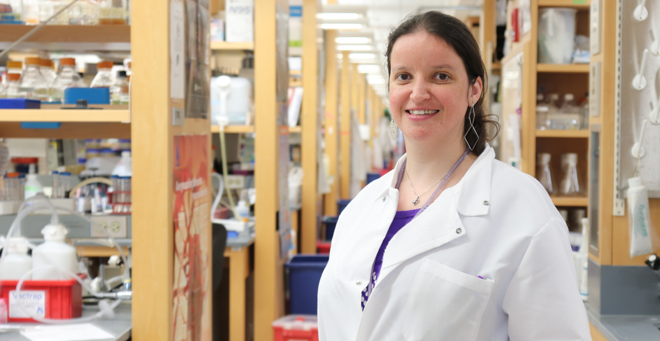
|
Research specialist Catherine Forconi, PhD, has received a 2019 Young Investigator Grant from the Alex’s Lemonade Stand Foundation to support research into endemic Burkitt lymphoma, an aggressive pediatric cancer and the most common childhood cancer in Africa.
The three-year, $150,000 grant will enable Dr. Forconi, who works in the lab of Ann M. Moormann, PhD, MPH, professor of medicine, to determine why the immune system for children who get the disease is compromised.
“Most researchers believe that what they’re working on is so important, and I truly believe what I’m working on is, but sometimes it’s hard to convince other people. I’m very happy that the Alex’s Lemonade Foundation also sees the importance in this research and that I’ve received this award,” Forconi said.
“If we can determine which parts of the immune system are important for fighting endemic Burkitt lymphoma, then we can determine other therapies that can be given to improve survival for these children,” she said.
Although the disease is treatable with chemotherapy, the survival rate for African children is 50 percent compared to the 90 percent survival for children in the United States. This could be due to two common childhood infections that are considered risk factors for the disease: malaria and Epstein-Barr virus.
A healthy immune system is able to recognize and kill human cells that have become infected or have become cancer cells. Most often, children with endemic Burkitt lymphoma live in areas of Africa where they contract several malaria infections each year and have greater exposure to Epstein-Barr infection when they are infants.
Normally, Epstein-Barr does not cause any illness in infants, but it can cause B cells to become cancer cells. Endemic Burkitt lymphoma is a B cell cancer that is almost always infected with Epstein-Barr. If the immune system has been weakened, then it’s more likely the person could develop cancer.
Forconi’s research will specifically focus on the status of the CD56neg NK cell profile. Preliminary data suggests that these cells may play an unconventional role in fighting cancer. Using varying techniques, Forconi will investigate whether these cells present in children with the disease are deficient in tumor cell killing or mediate tumor cell killing using alternative mechanisms.
The Young Investigator Grant from Alex’s Lemonade Stand Foundation encourages early-career scientists to advance pediatric cancer research by providing crucial support at the end of their fellowship training.